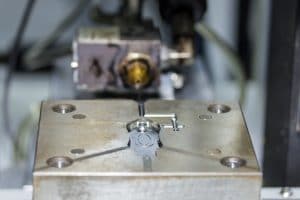 Not long ago, the most innovative thing about heat exchangers was the fact that they could achieve high-performance electrical cooling with minimal energy or maintenance. While these were significant benefits, they only tapped the surface of the potential that heat exchangers could bring to companies in all industries. For example, beyond cooling electrical enclosures with unprecedented efficiency, heat exchangers can also be utilized for several more highly specific applications. That includes machine tool cooling; with specialized heat exchangers, known as thermal pins, molding companies can make cooling molds a faster, more reliable, and more profitable process.
Not long ago, the most innovative thing about heat exchangers was the fact that they could achieve high-performance electrical cooling with minimal energy or maintenance. While these were significant benefits, they only tapped the surface of the potential that heat exchangers could bring to companies in all industries. For example, beyond cooling electrical enclosures with unprecedented efficiency, heat exchangers can also be utilized for several more highly specific applications. That includes machine tool cooling; with specialized heat exchangers, known as thermal pins, molding companies can make cooling molds a faster, more reliable, and more profitable process.
The principles of heat exchanger tech
What gives heat exchangers their unique capabilities is the innovative whey they approach electrical thermal management. The goal of electrical cooling is to prevent waste heat from electrical components accumulating into heat pockets within an enclosure, which could prove disastrous to the sensitive components. Instead of pumping chilled air through the enclosure, like traditional cooling solutions, heat exchangers use an eco-friendly cooling fluid to keep waste constantly circulating away. The principles of transferring waste heat can be accomplished in several ways, which makes customizing heat exchanger technology for other applications far easier and more effective.
Thermal management and machine tool cooling
As companies in various industries became more comfortable with heat exchanger technology over the years, the advantages of transferring waste heat became apparent for a wider range of applications. For example, in industries such as molding, thermal management takes on more forms than just cooling electrical enclosures. The process of rapidly removing heat from molds is core to a company’s production, and the principles of transferring heat offer a highly effective, highly reliable, high-performance solution. Known as thermal pins, specialized heat exchangers designed for molding equipment can rapidly remove heat with the same reliability as traditional heat exchangers removing heat from an electrical enclosure.
The advantages of custom-designed thermal pins
Molding companies may utilize conventional heat exchangers to keep their electrical enclosures cooled, but when they implement thermal pins for their molding equipment, the advantages of transferring heat become much more impactful. The efficient and eco-friendly methods of transferring heat help significantly reduce overall energy consumption, and the isothermal nature of thermal pins helps ensure high-quality results for each and every mold.
For more information about heat exchangers made specifically for the molding industry, call Noren Thermal Solutions in Taylor, TX, at 866-936-6736.







